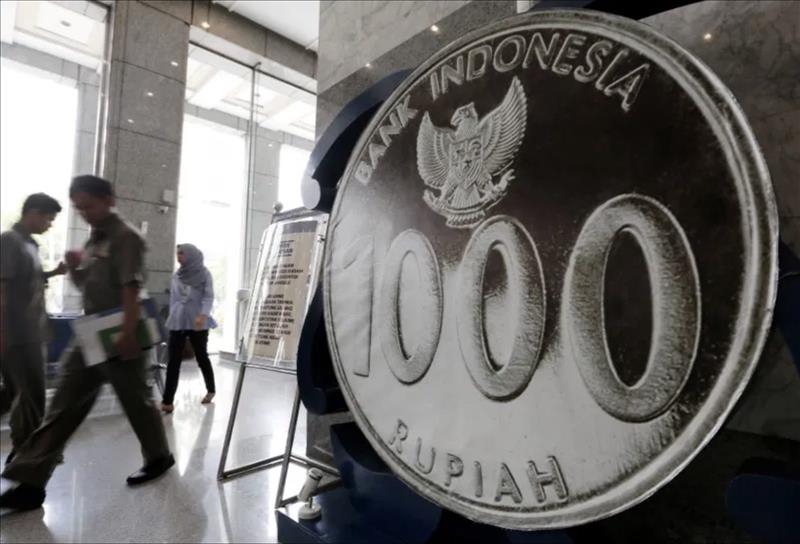Indonesia's Ill-Timed Return To The Financial Brink
The vast majority of Bank Indonesia watchers were shocked by this week's surprise interest rate cut . BI was almost universally expected to stand pat amid uncertainty about the trajectory of the global economy.
BI was seen taking a wait-and-see approach, given the abrupt firing of globally respected Finance Minister Sri Mulyani Indrawati. This came as President Prabowo Subianto sets his sights on 8% growth by 2029, a rate not seen since just before the 1997-98 Asian financial crisis.
“Her removal ... raises investor concerns about fiscal discipline as Prabowo pushes for ambitious growth targets,” warned advisory firm Bower Group Asia.
On September 8, Sri Mulyani, long seen as the key guardrail against a return of fiscal-policy overreach, was quickly replaced by Prabowo loyalist Purbaya Yudhi Sadewa. Purbaya wasted no time in pumping roughly $12 billion into the economy to spur lending.
The new finance minister is hitting the ground running on Prabowo's controversial“burden sharing” plan to prod BI to loosen monetary policy as the finance ministry hits the fiscal gas.
In a joint statement, the finance ministry and BI assured global investors that the arrangement will be conducted“transparently, accountably and with strong governance.”
They claimed the“synergy continues to refer to the principles of prudent fiscal and monetary policies, while maintaining market discipline and integrity.”
Economists, though, worry BI is about to become a tool of the president's growth strategy. On September 9, Capital Economics wrote:“Concerns about the independence of Bank Indonesia have grown following the announcement of a fresh 'burden-sharing' agreement with the government and, most recently, the removal of respected finance minister Sri Mulyani from her post.
“The experience from other EMs shows that an erosion of central bank independence typically leads to higher inflation and inflation expectations. A prolonged period of high real interest rates would, eventually, be needed to get inflation back down.”
Paramadina University economist Wijayanto Samirin told Reuters the scheme has“the potential to damage BI's reputation as an independent institution. Several things BI is doing are odd. They get too deep and detailed into fiscal matters and this disrupts our monetary policy ecosystem.”
This gambit comes as US President Donald Trump is endeavoring to neuter the US Fed's independence. He's angling to fire Fed Chair Jerome Powell, remove Governor Lisa Cook and load the policy board with loyalists like White House economist Stephen Miran.
On Wednesday, Miran, at his first Fed meeting, was the only dissenting vote in favor of a cut bigger than the 25 basis points Powell & Co. announced. Trump, though, is hardly done with trying to commandeer the Fed's decision-making.
Latest stories
Poland border closure choking China-EU rail trade

Unwinding India's failed economic zone in Bangladesh

Saudi-Pakistan defense pact more symbolism than substance
In the meantime, Miran brings a MAGA voice into Fed deliberations. Last year, he co-authored a Manhattan Institute report calling the Fed's autonomy an outdated“shibboleth.”
Miran favors, among other things, shorter terms for Fed governors, giving Congress greater say over the Fed's budget and making it easier to fire governors.
“Central bank independence has long been considered an essential element for successful monetary policy,” the report Miran co-authored said.“But central banks are creations of political exigency, and pure independence exists only in textbooks. It can also bestow power without accountability.”
In BI's case, the timing of this week's 25-basis-point rate cut to 4.75% made for terrible optics, given the politics surrounding the decision.
The same goes for Governor Perry Warjiyo, saying BI's monetary policy is“all-out pro-growth, while maintaining stability .” Though he assured markets the central bank would be“prudent and measured,” worries abound.
“BI officials are caught between a rock and a hard place right now,” said Capital Economics' Jason Tuvey.“You'd like to think that, given the concerns about independence and also that fiscal policy might become more supportive, officials would refrain from a third consecutive cut. But that would clearly run the risk of proving unpopular with the government.”
Context matters. All this is happening as former military bigwig Prabowo sidelines allies of former President Joko Widodo, who helped him get elected. The goal is to clear the way for a surge in government spending on giant infrastructure projects and populist social welfare handouts.
Prabowo's efforts to reduce the central bank's independence and launch budget-busting populist spending policies suggest he understands little about the forces that brought on Indonesia's 1997-98 crash.
His strong-arm tactics toward international companies like Apple suggest Prabowo's government is more interested in control than competitiveness in the globe's most dynamic economic region.
That's not to say Prabowo's government has turned completely inward. Last week, the central banks of Indonesia and China launched a local currency settlement framework for bilateral transactions. The plan is to increase the use of local currencies in bilateral trade and investment.
Previously, bilateral payment links between the People's Bank of China and BI were limited to current account transactions and direct investment. It could signal the beginning of a pivot by Southeast Asian economies to peg currencies to the yuan rather than the dollar.
Yet, so much of what Prabowo's government is doing seems to ignore lessons from Asia's not-so-distant past.
Apparently, the 1Malaysia Development Berhad (1MDB) debacle didn't stop Prabowo from setting up a sovereign wealth fund called Danantara and championing runaway security and defense spending.
All this represents more of the Chinafication of Indonesia than a serious effort to take the economy upmarket 27 years after the Asian financial crisis.
Last month, Prabowo vowed to fight“those who relentlessly pursue maximum profit, deceive and exploit our people, and carry those profits out of the Republic of Indonesia.”
Yet the return of violent protests in Jakarta, extreme currency volatility and the sudden sacking of high-level cabinet officials carry an air of deja vu.
“The piecemeal response falls far short of the reforms needed to put the economy back on track,” said economist Priyanka Kishore at Asia Decoded.“In fact, replacing Sri Mulyani, who is widely respected in the investor community, with the untested Purbaya, could end up exacerbating the government challenges as we discuss later.”
Kishore added that recent“protests have highlighted the tension between the narrative of a stable economy anchored around 5% GDP growth , and the reality of a shrinking Indonesian middle class with limited employment prospects, which has been evident in the bottom-up data for a while.”
Perhaps sensing the sour public mood, Prabowo is setting his sights on Indonesia's billionaires. Convinced the tycoons are flying too high and exerting too much influence on politics, Prabowo's team is looking for ways to seize alleged ill-gotten gains. That's having a chilling effect on investment.
Prabowo will have to go much further than that to narrow the wealth gap. For the last six quarters, Kishore explained, private consumption has grown by 4.9%-5% year on year.
But average monthly vehicle sales have been on a downtrend for the last two years, and retail sales have contracted over the past four months. Consumer confidence has slumped, driven by weakening employment expectations.
According to the Manpower Ministry, 42,835 workers were laid off in the first half of 2025, mostly in manufacturing. This is a 32% jump over the same period last year, and yet it doesn't fully account for the informal jobs that represent 60% of total employment and are more vulnerable to downturns.

Sign up for one of our free newsletters
-
The Daily Report
Start your day right with Asia Times' top stories
AT Weekly Report
A weekly roundup of Asia Times' most-read stories
“Prabowo's plan to address these concerns by stepping up public expenditure, as articulated by Purbaya, risks fueling debt without resolving the structural issues holding back investment and job creation,” Kishore warned.“To the growing strains on the economy, we can now add heightened risks of fiscal instability.”
Indonesia is far from the only key Asian economy in which politics has become a wild card.
“Protests in Malaysia tied to cost-of-living concerns, unrest in Indonesia over economic inequality and political elitism, a leadership shake-up in Thailand and the resignation of Japanese Prime Minister Shigeru Ishiba have created pockets of instability,” said Stefan Angrick, an economist at Moody's Analytics.
Angrick added that“policy drift is becoming a concern just as the region faces one of its toughest macroeconomic environments in years. All told, the APAC region is at a critical juncture. With the front-loading boost behind us and external demand under siege, the region's long-favored growth model is under pressure.
“Looser monetary policy may soften the blow, but it cannot offset the structural challenge a more hostile global trade order poses. How the region adapts will shape its trajectory for years to come.”
In the case of Indonesia, the focus on fiscal loosening over reforms to raise the nation's economic game is unnerving the bond market. Purbaya wasted no time transferring half of the 400 trillion rupiah ($24 billion) in cash reserves the Ministry of Finance holds with the central bank to state-owned lenders. Such maneuvers sent the rupiah lower and caused the yield curve of Indonesian bonds to steepen the most since 2003.
Strategist Jennifer Kusuma at ANZ Banking Group noted the BI's expanding role in the sovereign debt market“would foster moral hazard risks” going forward. Citigroup economist Helmi Arman said it's“not impossible” for Indonesia's 3% fiscal deficit cap to be changed if the government thinks it's going to miss its growth targets.
The bigger problem is that by prioritizing control over creating a more productive economy, Prabowo and his new finance minister risk dragging Southeast Asia's biggest economy back to the days of living dangerously.
Follow William Pesek on X at @WilliamPesek
Sign up here to comment on Asia Times stories Or Sign in to an existing accoun
Thank you for registering!
An account was already registered with this email. Please check your inbox for an authentication link.
-
Click to share on X (Opens in new window)
X
Click to share on LinkedIn (Opens in new window)
LinkedIn
Click to share on Facebook (Opens in new window)
Facebook
Click to share on WhatsApp (Opens in new window)
WhatsApp
Click to share on Reddit (Opens in new window)
Reddit
Click to email a link to a friend (Opens in new window)
Email
Click to print (Opens in new window)
Print

Legal Disclaimer:
MENAFN provides the
information “as is” without warranty of any kind. We do not accept
any responsibility or liability for the accuracy, content, images,
videos, licenses, completeness, legality, or reliability of the information
contained in this article. If you have any complaints or copyright
issues related to this article, kindly contact the provider above.
Most popular stories
Market Research

- R0AR Chain Launches Public Node Sale Following $1 Million Whitelist Success
- Forex Expo Dubai 2025 Returns October 67 With Exclusive Prize Draw Including Jetour X70 FL
- 1Inch Unlocks Access To Tokenized Rwas Via Swap API
- Falcon Finance Announced $FF And Community Sale On Buidlpad
- DOLLUM Expands Wallet Opportunities, Introducing New Security Features Following The DOL Token Sale
- Ethereum Based Meme Coin Pepeto Presale Past $6.6 Million As Exchange Demo Launches





















Comments
No comment